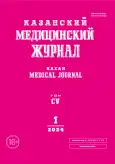On modern Russian scientific schools in the history of medicine and the criteria for their validity
- Authors: Albitskiy V.Y.1
-
Affiliations:
- Research Institute of Pediatrics and Children's Health, Scientific and Clinical Center No. 2 of the Russian Scientific Center for Surgery named after B.V. Petrovsky
- Issue: Vol 105, No 1 (2024)
- Pages: 152-158
- Section: History of medicine
- Submitted: 30.01.2024
- Accepted: 30.01.2024
- Published: 02.02.2024
- URL: https://kazanmedjournal.ru/kazanmedj/article/view/626239
- DOI: https://doi.org/10.17816/KMJ626239
- ID: 626239
Cite item
Abstract
In the second half of the 20th century in the USSR there were two influential schools of medical historians, competing with each other: the school of B.D. Petrov (Department of the History of Medicine of the Research Institute of Healthcare Organization and History of Medicine named after N.A. Semashko) and the school of F.R. Borodulin [Department of the History of Medicine of the First Moscow Medical Institute (Moscow Medical Academy named after I.M. Sechenov)]. With the end of the Soviet era in the history of the country, the influence of these schools also ended. In the 21st century, according to the author, there are also two scientific schools of medical historians functioning in Russia, they were created respectively by Academician A.M. Stochik and Professor V.I. Borodulin. Both schools have no genetic connection with the schools of the twentieth century and successfully continue the development of the scientific history of medicine, interrupted in the 20s of the twentieth century. In his research, the author uses the criteria for the viability of scientific schools proposed by V.I. Borodulin in relation to clinical schools. The decisive criterion is the presence of an original scientific direction developed by the teacher and his students. The author highlights such directions in the work of scientific teams headed by A.M. Stochik and V.I. Borodulin and indicates the leading representatives of these schools. The issues of “registration” of each student in a given school, partial “adjacent” to the school, and affiliated schools are also considered.
Full Text
About the authors
Valeriy Yu. Albitskiy
Research Institute of Pediatrics and Children's Health, Scientific and Clinical Center No. 2 of the Russian Scientific Center for Surgery named after B.V. Petrovsky
Author for correspondence.
Email: albicky@yandex.ru
ORCID iD: 0000-0003-4314-8366
M.D., D. Sci. (Med.), Prof., Head Researcher, Depart. of Social Pediatrics and multidisciplinary support
Russian Federation, Moscow, RussiaReferences
- Borodulin VI. The manifesto of new Russian historians of medicine: The open letter to editorial board of the journal “The Problems of Social Hygiene, Health Care and History of Medicine”. Probl Sotsialnoi Gig Zdravookhranenniiai Istor Med. 2023;31(3):487–489. (In Russ.) doi: 10.32687/0869-866X-2023-31-3-487-489.
- Zatravkin SN, Vishlenkova EA. “Kluby” i “getto” sovetskogo zdravookhraneniya. (“Clubs” and “ghettos” of Soviet healthcare.) M.: Shiko; 2022. 347 p. (In Russ.)
- Borodulin VI, Topolyanskiy AV. Moskovskie terapevticheskie shkoly. 20-e — 40-e gody 20-go veka. (Moscow therapeutic schools. 20s — 40s of the 20th century.) M.: Shiko; 2013. р. 6–17. (In Russ.)
- Albitsky VYu, Gallyamov AV. Review of the book by A.G. Lushnikova “Clinic of Internal Diseases in the USSR”, M., 1972. Klinicheskaya meditsina. 1973;(1):38. (In Russ.)
- Arhangelskiy GV. Historical and medical aspects of studying of the role of scientific schools in the development of medical science. Sovetskoe zdravookhranenie. 1987;(6):61–64. (In Russ.)
- Borodulin VI. Ocherki istorii otechestvennoy kardiologii. (Essays on the history of Russian cardiology.) M.: Meditsina; 1988. р. 89–93. (In Russ.)
- Borodulin VI, Glyantsev SP. Our approaches to studying of the problem of scientific clinical schools in Russia. Historiae medicinae scriptorum Rossicorum OPERA MEDICA HISTORICA. Rossiyskikh istorikov meditsiny TRUDY PO ISTORII MEDITSINY. Al’manakh ROIM. Vol. 1. M.: Magistral; 2016. р. 222–229. (In Russ.)
Supplementary files






